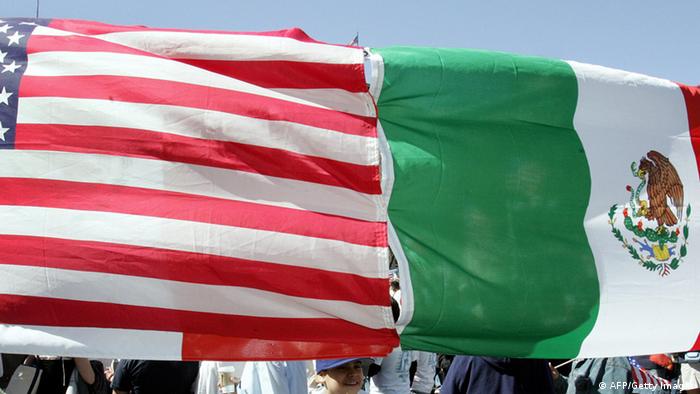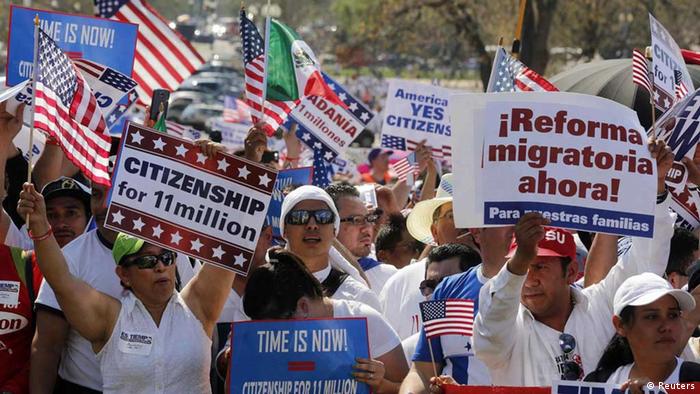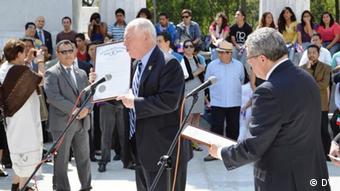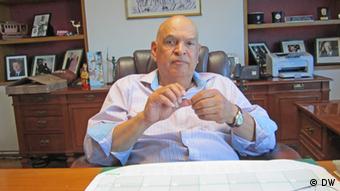US President Barack Obama's trip to Mexico comes at a time when a number of crucial issues are playing a major role in shaping the respective countries' policies - from immigration to the drug war and gun control.
Less than four days before he was inaugurated as President of Mexico in December, Enrique Peña Nieto was shaking hands with President Barack Obama in the Oval Office - a crystal clear statement of intent, which was certainly not lost on Washington, or the man in charge of it.
"I think that's representative of the strength of the relationship between the United States and Mexico. It's not just a matter of policy, but it's a matter of people, as represented by the many US citizens who travel to Mexico, who live in Mexico, and obviously the incredible contribution that Mexican Americans make to our economy, our society and our politics," Obama said.
Enrique Peña Nieto's response was equally fulsome. "We're both very sensitive to the needs of our peoples. And we also share a very important vision of creating jobs."
President Obama is just about to return the travel compliment, and with interest. The White House has announced that economic and trade ties will be discussed during his visit, before he travels on to Costa Rica. Mexico's Foreign Ministry, more expansively, says a wide range of issues will be on the table.
One of those will be comprehensive immigration reform. It's a painfully lingering thorn in the US underbelly, involving more than 11 million undocumented migrants on US soil - at least eight million of whom are Mexican. Relegated to the back burner time and again, it finally appears that US Congress is grasping the nettle.
US Senator Marco Rubio says a proposed immigration bill won't offer amnesty to those who are undocumented and arriving illegally in the United States. The proposals include rigorous background checks, the paying of fines and application fees for work permits and also the payments of taxes.
Immigration issue
David Marciel is an Emeritus Professor at UCLA and lectures in Mexican history and border issues including immigration. Marciel says that following last year's US election, there's a keen and developing realization, especially from the Republicans, that immigration reform is a significant vote winner and can no longer be ignored. "I would go as far as to say that's why immigration reform is happening at the moment. The Republicans realize they will never get anywhere without the Latino vote. We're doubling our population every 20 years because we're a young population. The median age is 27 in the Latino population. It's not dependent on immigration. It's natural birth that is happening."
Professor Jose Luis Valdes Ugalde, who's a leading member of the Center of Investigations for North America at UNAM, agrees. "I think they are very pragmatic in the US Congress. If they refuse to carry on with immigration reforms proposed by President Obama they don't have any possibilities with the Latino vote in the future. In the short term…and the short term is already here! In two years time there will be elections in the US Congress, so they have to be prepared."
The Governor of Illinois, Pat Quinn, has just led a sizeable trade mission to Mexico, and welcomes President Obama's upcoming trip to Mexico. Illinois has already taken the lead by introducing a law called the Dream Act, which allows for undocumented immigrant students to get a private scholarship to go to college. It's also passed a law providing drivers' licenses to undocumented immigrants there as a safety measure.
"These are the kind of things that show we can do this. We can do something together-bi-partisan, Democrat and Republican for the good of America. The energy of our immigrant population is very special. Indeed, it's going to make our country better," says Quinn.
Manuel Camacho Solis is a veteran of Mexican politics. A serving Senator with the Party of Democratic Revolution - the PRD, he's been Mexico's Foreign Minister, Mayor of Mexico City and Peace Commissioner following the Zapatista uprising in the southern State of Chiapas.
He suggests this can either be a grinning contest or a winning plus invaluable meeting of minds. "It's not just a question of public relations. It's a matter of important issues that have to be discussed. If President Peña Nieto is able to re-establish a new agenda with the United States, then the visit of President Obama will be fruitful…otherwise it'll just be a photo opportunity."
Drugs and guns
There's no escaping Mexico's eight-year drug war, which has cost more than 73,000 lives with an estimated 27,000 people reported as disappeared. Manuel Camacho Solis says the issues of violence and security, which were discussed during a recent visit by US Attorney General Eric Holder with his opposite number Jesus Murillo Karam, have to be looked into more thoroughly by their two Leaders. "What is going to be the Mexican strategy to deal with this? It can't be just more police. It has to be much more holistic and more complete to convince the Americans that we are committed to respecting human rights in Mexico."
Presidents Obama and Peña Nieto are staring down the barrel of a major bi-lateral policy failure. More than 90 percent of the guns in the hands of Mexican drug cartels are of US origin. Yet attempts to trace illegal gun running has been a disaster. Operation Fast and Furious, launched and overseen by the Bureau of Alcohol, Tobacco, Firearms and Explosives between 2006 and 2011, ended in chaos. An attempt at gun walking - letting guns walk by allowing licensed firearms dealers to sell guns to illegal buyers acting as fronts for the cartels and attempting to follow their path - lost track. Only some 700 guns out of 2,000 involved were recovered. Tragically, one of them was used to murder US Border Patrol Agent Brian Terry in Santa Cruz County, Arizona, in December 2010.
Last month, US Senators blocked bipartisan proposed legislation to support expanded background checks for firearm purchases. President Obama tersely termed it as "a pretty shameful day for Washington, but this effort is not over." To add insult to injury, the ban on assault weapons in the United States, which lapsed way back in 2004, has never been renewed.
Manuel Camacho Solis says this is a critical issue that both presidents must thrash out. "We are completely with President Obama and completely against the National Rifle Association. The role of Mexico is not to just look at the issue, but to do the most effective job possible in terms of public relations, exerting a cost on those people who back these decisions. Because if it doesn't cost you, you keep on doing it."
Rolando Soliz, who runs a prestigious executive security firm in Mexico, was a US Secret Service Agent for 23 years. In that span, he was a bodyguard for Presidents Nixon, Ford, Carter, Regan and Bush Sr. He urges current Presidents Obama and Peña Nieto to swiftly agree practical measures to stop the deluge of guns flooding into Mexico. "We have to stop those weapons before they come into Mexico. We have to work with the Mexicans at the border for them to tighten up the controls, by tightening up who you're having in the enforcement at the border. That is critical."
A critical time, then, for critical issues. The two presidents have lots to talk about and little time to do it. dw de





No comments:
Post a Comment